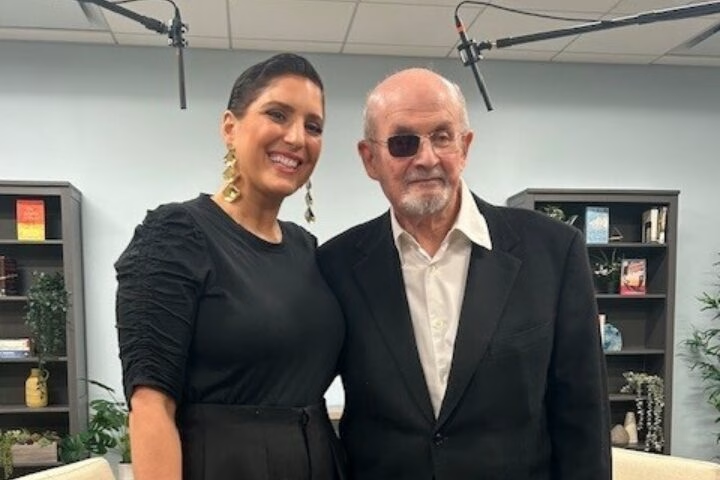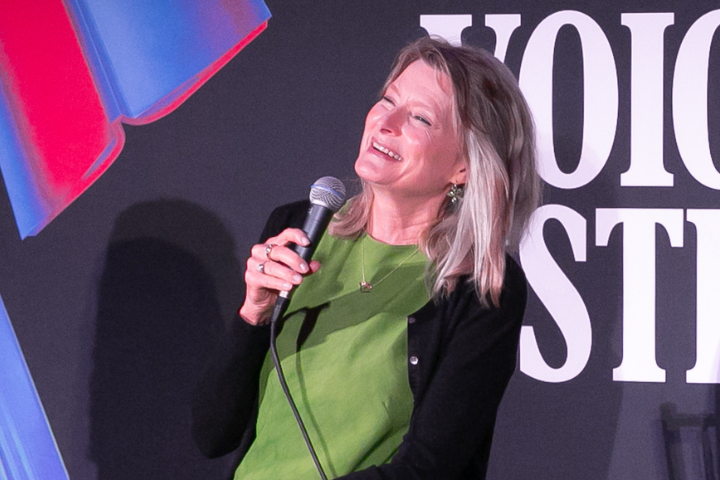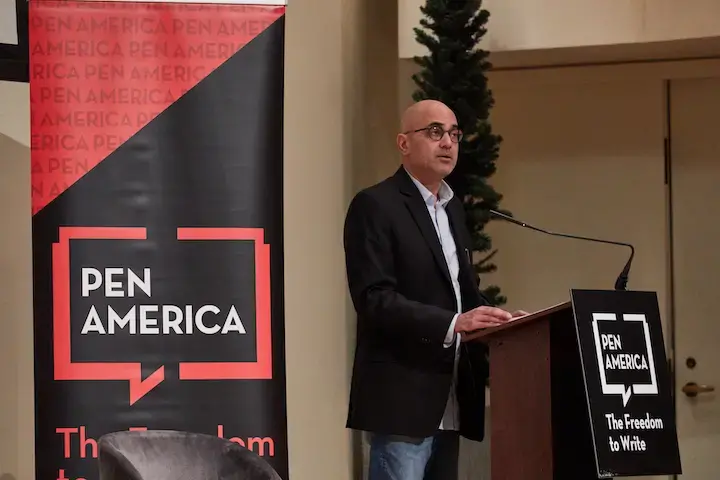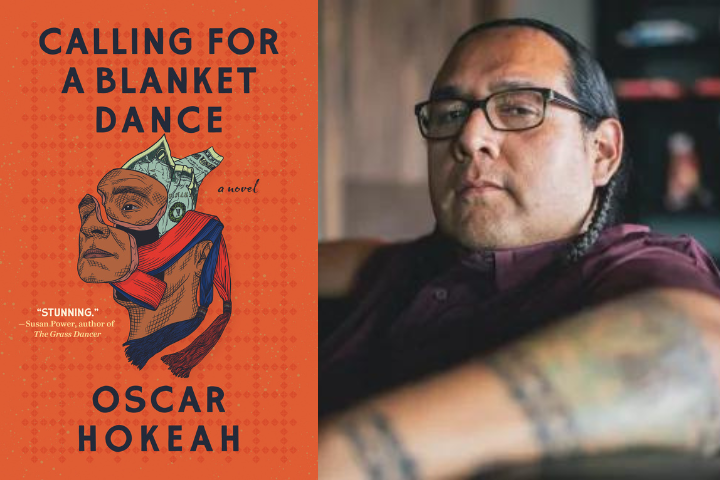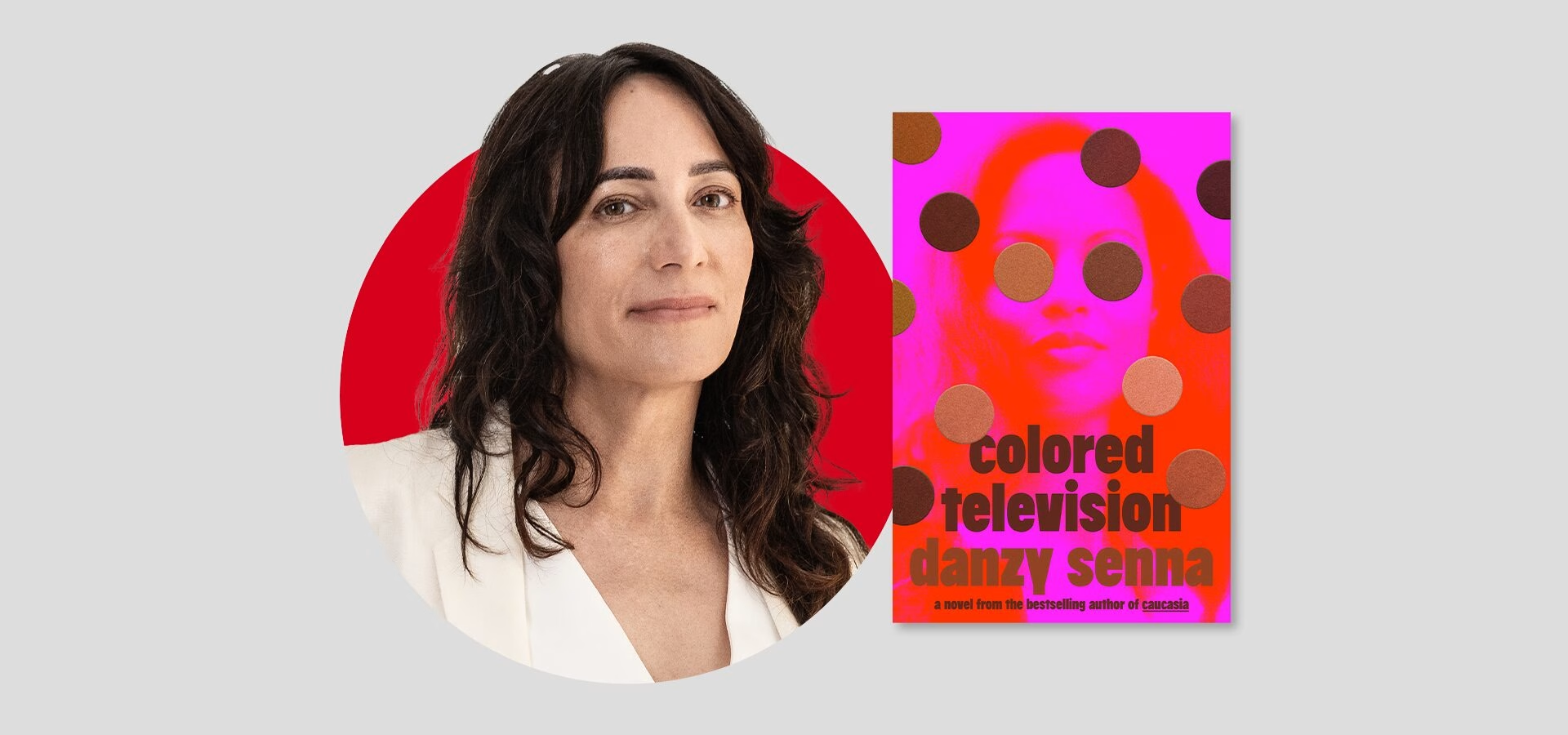
Danzy Senna | The PEN Ten Interview
September 5, 2024
Danzy Senna’s latest novel, Colored Television (Riverhead, 2024), contends with artistic identity, social status, and the experience of being mixed race, reclaiming the word ‘mulatto,’ in a story that is both funny and dismal. Protagonist Jane is struggling to write her second novel with the hope that it will bring her tenure, financial security, and recognition. However, this dream is quickly derailed. Suddenly, she finds herself grappling with career choices, her role as a wife and mother, and the future she desperately wants to build in the neighborhood of Multicultural Mayberry.
In conversation with World Voices Festival & Literary Programs Coordinator, Sarah Dillard, Danzy Senna highlights how racial commentary is artistry, what it feels like to write a novel, and the limitlessness of mulatto stories. (Bookshop, Barnes & Noble)
1. Colored Television centers around a writer, Jane, who is trying to complete her second novel. According to her agent, Honor, an author’s second novel is “always a disappointment.” What’s the difference between writing your first novel vs. your second? Do you relate to Jane’s struggle and her agent’s advice?
I think it’s always true for every writer that your debut novel stands on its own, but your second novel is always seen in relation to what came before. The second novel is where the comparisons begin, particularly if your first novel happens to be a big success. You can feel like you are being set up to fail. Add racial dynamics into this equation and there is a whole other layer of complication. Like Jane, I struggled after Caucasia with anxiety, imposter syndrome. I was, like Jane, processing the regular pressures of writing the follow up, compounded by the racial projections thrown onto me as a writer of “uncertain color.” In these creative industries, the entire system is set up around a racial binary. And if the industry isn’t sure what color you represent, which shelf to put you on, you are more often than not met with bewilderment. All of which is to say, I definitely drew on all these experiences when writing the character of Jane and her experience with her second novel.
2. In the beginning of the novel, Jane jokes that if her husband, Lenny, were to add race into his paintings they would “sell like hotcakes.” What do you believe people have appreciated the most about your work–its artistry, its commentary on race and identity, or both equally?
I don’t really see any distinction between artistry and race commentary. To grapple with race is not at odds or separate from the craft of writing fiction. That feels like a flawed paradigm, but it’s one we all face as writers of color. I think good writing is aware of the society that surrounds the characters – and the history that has created them. It seems obvious to say, but you have to write specific people who are born into a particular place and time. For me, race is an artistic concern. It’s a literary and craft concern. I never want to read a post-racial novel. If you are missing the prevalence and importance of race in American life, then you are really missing a huge part of the world you are writing about. And it will shackle and limit the story you are trying to tell.
Often I’ll read something that is feigning color-blindness or deals with the race of the characters in a way that is cringey and too revealing of the author’s blind spots. Often it treats whiteness as the default. I’d much rather a work know what it’s doing.
There’s an essay by Eudora Welty I’ve often assigned about geography in fiction, where she talks about how only Southern writers are considered regional. She argues that there is no great literature that is not regional – and not concerned with a particular place. I think this is true about “ethnic writing” versus supposed-non-ethnic writing.
I have no aspiration to write without an awareness of race. It simply doesn’t interest me artistically or seem like something to aspire toward.
“For me, race is an artistic concern. It’s a literary and craft concern. I never want to read a post-racial novel. If you are missing the prevalence and importance of race in American life, then you are really missing a huge part of the world you are writing about. And it will shackle and limit the story you are trying to tell.“
3. Jane worries about her future–especially after the interaction with her colleague, Kay. Have you ever been worried about your success or second-guessed your decision to become a writer? If so, how did you overcome that?
Of course. Plenty of times and over many years I’ve had those worries. You are never going to feel confident every day. I think the trick is to develop a practice that you sustain even despite these feelings. Years ago, I read an essay from the 1930s by this British journalist Cyril Connelly called “The Enemies of Promise.” He wrote about all the ways that a novelist can fizzle out after their first novel. The first line of the essay is: “Whom the gods wish to destroy, they first call promising.” I felt “promising” for a long time, meaning I felt my first novel’s success would curse me and silence me and there was nothing more I could say. I guess the good news is I don’t feel promising anymore. Now I feel like I’m just a writer. And I’m doing what I want to do and some people will love and get it and others won’t. I understand more clearly that nothing good comes from writing by committee or trying to please everyone. I think the key is to just keep doing your work and fighting for it to find its readers and its place in the world. You have to develop a commitment to your craft that sort of defies logic. And surround yourself with people who think highly of what you are doing. Close the door on the rest.
4. As a biracial (half Black and half white) person myself, I found parts of the story surprisingly accurate. “Mulatto mirroring” was one example–when mixed race people imitate the accent or cadence of someone else’s voice. Where does this come from? Is it because of a tendency to code switch, a lack of a clear sense of self, or something else?
I enjoy getting granular about mixed people – exploring our various quirks and neuroses and issues. Some of these observations may hit a nerve or have a grain of truth, may resonate – some of them may be utter bullshit. Sometimes I insert an observation but it’s just my way of saying something about the character who is doing the observing.
My mother had this book lying around our house in the 1980s called “The Big Book of Jewish Humor.” I remember looking through it as a kid and understanding that Jewish people had their own inside jokes, and this fact alone somehow made me feel that Jewish people were their own club, a tribe, with an inside and an outside.
I think my work has specifically “mulatto humor” – jokes that are first and foremost there for us to understand. And with these jokes, I may be implicitly arguing that mulattos are our own culture, that we are in fact a people – which is always up for debate.
5. When writing, Jane has an interesting process. For example, she cuts and glues pieces of Cavendish’s work into sections of her novel. She also only writes with pen and paper when meeting with T.V. producer, Hampton Ford, in order to seem more like an author. What is your writing process like?
For me, personally, writing is a hot mess. I do whatever it takes to get it done. I write both by hand in a notebook and on the computer. I write mostly outside the house, in libraries and cafes where I focus better, but I often edit at home. Writing is so hard. It’s terrifying. And yet, when it goes well, it’s magical – better than any drug. You write for that fleeting moment when you get to see your Frankenstein creation come to life.
“Television is unlike poetry or fiction in that it’s a collaborative art. And because of this, amongst TV people there’s less viciousness on the surface. At least Jane thinks so. But just beneath that smiling surface, there’s something maybe more dangerous.“
6. I love your animalistic breakdown of poets, novelists, and screenwriters. Do the varied levels of competitiveness come naturally to each type of writer or is it caused by their respective publishing environment? How could these dynamics be changed?
I was making fun of the fact that the people with the least financial reward – the smallest piece of the pie – fight the most viciously amongst themselves. In other words, poets. There is no practical or market value to what poets do. It’s probably the purest form of writing in the artistic sense, but perhaps because of this, it’s the most ego-driven. Don’t get me wrong, I love poets, but there is a level of snark in that world that puts to shame any other genre. Novelists are second – almost as bad as poets about one another. I’ve never seen anyone get so much deep pleasure as a novelist reading a terrible review of another more successful novelist. Television is unlike poetry or fiction in that it’s a collaborative art. And because of this, amongst TV people there’s less viciousness on the surface. At least Jane thinks so. But just beneath that smiling surface, there’s something maybe more dangerous.
7. Jane has an interesting relationship with Brett, the TV writer who attended the same MFA program as her and who is now letting her temporarily stay in his luxurious house. Why is it important for writers to support each other?
Over the years, I’ve found my survival as a writer really depends on me having great writer friends who are my early readers. When I was writing this novel, I shared pages with a group of four women writers in Los Angeles whose work I really respect. For years we’ve been sharing work with each other, and it’s been a lifeline for all of us.
I encourage young writers to find your people. It’s a hard and lonely world out there as a writer and you will need friends.
8. There’s a shift in Jane’s mood when she goes from writing her novel to writing for TV. She’s more hopeful, has more distance, and is able to find a balance between work and family obligations. Where does this come from? What gives her the freedom to enjoy life?
Television is like a new lover for Jane. In her honeymoon period, she imagines TV is the answer to all her problems. It feels so much better than the lonely, depressive work of writing a novel. Novel writing has not only led to financial ruin for Jane but has kept her isolated from the world, from fun, from joy. And she’s wondering why she’s committed herself so deeply to this failed enterprise. She thinks of television as this glittery solution to all her financial and creative and even psychological problems. She imagines it won’t take over her life in the same way as the novel has and she imagines that it won’t be so obsessive, dream-like, hard to manage with the daily work of being human. I think it’s a common perception, and it’s not all wrong. But it’s not the full story, as she finds out.
9. The moment Jane finishes her writing project, she cries. How have you felt after finishing a novel? Is it different than after completing a shorter piece of writing?
I naturally lean toward writing novels – though I love reading and writing short stories. Novels are more like a marriage, stories more like affairs. A novel is something you live with for years and the characters in it become your second world, your second life. You think about them when you are not with them. You consider breaking up with them. You love them, you hate them. You fear them and avoid them and then run toward them and have a hard time extricating yourself from them. It’s such a whole body and mind experience that when it’s over and you are finally done, you experience real grief. Relief too, but also grief and a kind of identity crisis. You don’t know who you are without these characters to return to and wrestle with. I have a really hard time letting go of projects. But I’m getting better at it! With my first novel, when I was having such a hard time letting it go, I remember my brother saying to me, “It’s just a record of your creative mindset in a particular moment. You can’t drag it into the next moment. Let it be a record.” That was very helpful to me in terms of letting go – understanding there is no perfect version of the novel, there is only a time and place you wrote it as well as you could, reflecting your preoccupations, and then you move on.
“I’ve been writing about mixed characters since I started my career. And people keep expecting me to graduate from these worlds and these characters in a way that they don’t expect other groups to move past their own worlds. I find that assumption placed on mixed-race authors so interesting.“
10. What impact do you hope Colored Television will have on the lexicon of mulatto narratives?
I don’t know, I’m probably the last one to say what the impact will be. I mean, it’s not another tale of a tragic mulatto. Jane’s real issue is not “What color am I?” She’s not grappling with some unresolvable conflict between her two sides. And it’s also not a story of a magical mulatto – the kind who’s supposed to be a symbol of hope, the blended face of the American future. That trope bores me even more than the tragic mulatto. I guess Mulatto-dom – the state of being a mulatto – is not the plot of the story, it’s more the backdrop, the cultural geography. Jane’s issues are bigger and wider than racial identity. She’s worried about her marriage and her art and her lack of money and her children and she’s trying to figure out how can she get the life she wants for all of them using the stories she has to tell. I’ve been writing about mixed characters since I started my career. And people keep expecting me to graduate from these worlds and these characters in a way that they don’t expect other groups to move past their own worlds. I find that assumption placed on mixed-race authors so interesting.
I had a biracial woman come up to me once after a reading and say that reading my work was the first time she understood that being biracial was its own thing – that being black-and-white mixed – a mulatto – was not simply an anomaly or a space between two points — but that it was its own kind of destination and geography. And from that understanding, there’s no limits on what kind of mixed stories you can tell.
Danzy Senna is the author of four previous works of fiction, including the bestselling Caucasia and, most recently, New People, as well as a memoir. The recipient of numerous awards and honors, she teaches writing at the University of Southern California.
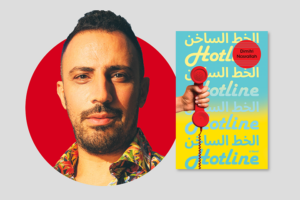
Dimitri Nasrallah | The PEN Ten Interview
Especially in a new city like Montreal, which is so drastically different from Beirut in almost every way, the language politics, neighborhood divisions, and weather are going to call into question every assumption a person has about how to live.
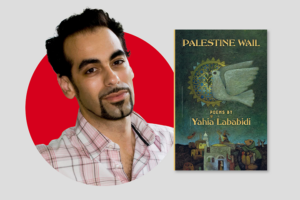
Yahia Lababidi | The PEN Ten Interview
When we refuse to acknowledge the suffering of others, and the role we play in it, we contribute to our own suffering, since we are One. The violence we commit throughout the world or allow to take place in our name is like a karmic serpent that will find its way home, to our doorstop.
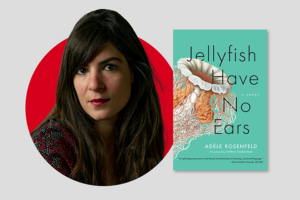
Adèle Rosenfeld | The PEN Ten Interview
An altered perception of sound results, oddly enough, in a sharper focus on sound and a more emotional relationship with hearing. The loss is overpowering, the obsession with hearing is outsize.
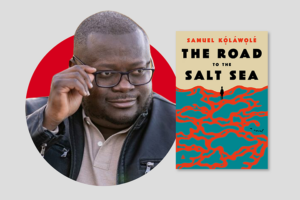
Samuel Kọ́láwọ́lé | The PEN Ten Interview
As authors, we create something we hope will be beautiful out of nothing. The outcome of our hard work is never guaranteed.

